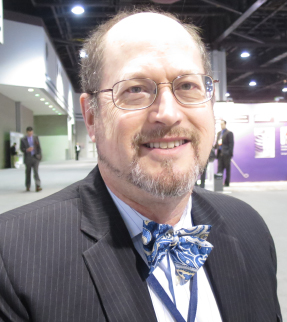
The World Conference on Interventional Oncology (WCIO) is developing an online interventional oncology curriculum called IO University. Michael Soulen, immediate past chair of the WCIO, told Interventional News: “One of the gaps in interventional radiology training is in oncology education. If you do an interventional radiology fellowship, you receive very little education in oncology; you learn how to do procedures, but you do not learn about cancer or what the other specialists do. You do not learn to be an effective participant in the oncology scene. The IO University is designed to address these gaps.”
Soulen drew attention to the estimation that “only 5%” of patients with liver disease will get access to interventional therapy. What are the barriers to patients’ access to interventional oncology therapies? First, the wider oncology community has to know about what we do; second, they have to know a practicing interventional oncologist; and most importantly, the practicing interventional oncologist has to understand enough oncology to engage with the oncologists, be able to take an active role on tumour boards and be credible enough to become one of the team,” he said.
The curriculum will be available as interactive modules online with multimedia resources including webinars with patient simulations and videos and will cover the basics of medical oncology, surgical oncology and radiation oncology. It will include patient assessment, therapy response, case studies, an understanding how the oncology literature works, disease-specific modules covering staging of cancers and standard treatment algorithms, how to integrate interventional oncology options into these, how to convince other oncology colleagues about the benefits of interventional oncology and more. There will also be in-depth modules on interventional oncology procedures.
“Last month, I was the guest speaker at a surgical oncology conference. The first question from the audience was: “You speak our language, but how do you get more interventional radiologists fluent in the language of oncology, so they can be helpful to us and become part of our team?” This is not something that can be taught in a one-year interventional radiology fellowship. We need a resource for people already out in practice who want to learn the language of oncology so they can break down the barrier between interventional radiology and other oncologic specialists and be effective integrating interventional oncology into patient care.
“The WCIO is working with the France Foundation, an award-winning, educational continuing medical education (CME) company that works for many specialties. The WCIO curriculum committee spent years designing a body of knowledge that interventional oncologists should know about cancer including cancer biology, how cancer is managed and what all the cancer specialists do. It will be a two- to three-year curriculum, available mostly online through interactive sessions. There will be CME available and, potentially also self-assessment modules (SAMs) and maintenance of certification (MOC),” Soulen added.
The curriculum is being developed by the WCIO thought leaders from around the world—US, Europe, South America, Asia and the Middle East. “We have a curriculum committee currently run by Robert Lewandowski, Chicago, USA, Alban Denys, Lausanne, Switzerland and Robert Suh, Los Angeles, USA, who are refining the programme. Our first IO University module is already available online at no charge on the IO Central website (IO-central.org). We have an extensive set of expert volunteers producing the content for each area, disease state, treatment modality and palliative care. The France Foundation will then take the content and produce the seminars, webinars, modules and videos. This will be a three-year project, and will be expensive, so we are looking to industry and other foundations to support it. I am very excited that Guerbet Group and Guerbet LLC have jointly agreed to provide a three-year grant supporting this endeavour,” Soulen said
“Clearly there is an understanding that we will have to layer on practical training as well. There will probably be hands-on training in selected centres around the USA and we are working out how to certify people and procedures,” Soulen noted.
Resource for future trainees
“This endeavour is particularly timely given the new interventional radiology residency in the USA,” Soulen said. “As training programmes transition to the new format over the next several years, we have the opportunity to develop multi-year curricula in vascular and non-vascular diseases and cancer which can become integral parts of a five-year residency. The IO University programme will enable every interventional radiology residency to offer comprehensive interventional oncology education without having to re-invent the wheel. I am hopeful about the possibility of working with the Society of Interventional Radiology (SIR) and SIR Foundation to leverage this product into a building block of the new interventional radiology residency to ensure that cancer patients have a continuous supply of well-trained and educated interventional oncology specialists.”
Recognition
“Practitioners of interventional oncology, the fastest-growing segment within interventional radiology, have frequently told us that they would benefit from some form of recognition of having undergone interventional oncology training as it would help with credibility in multidisciplinary tumour boards,” he continued. Those who follow the proposed WCIO curriculum will learn each module, take a test and can get CME credit for passing the test. “When the entire curriculum is completed, which will cover about 200 hours of learning, interventional oncologists will receive a certificate from the WCIO that you can take to a tumour board to confirm a knowledge of oncology,” Soulen said.
However, subspecialty certification in interventional oncology is a futuristic concept. It is important to remember that interventional oncology is part of interventional radiology, not a separate entity; it is a clinical discipline with a very specific knowledge and skill set that is needed to be able to treat cancer patients. People need to have access to that. Interventional oncology is an interventional radiology discipline for which we need a body of knowledge and education that does not exist in the current paradigm and the goal is to offer that training and a certificate to qualified physicians. This has nothing to do with credentialing or board certification, it is about the patients. We are not trying to create a new specialty, we are trying to create patient access to the wonderful care interventional oncology has to offer.” Soulen concluded.













